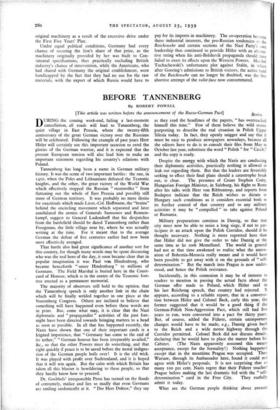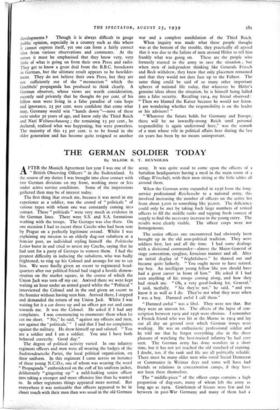BEFORE TANNENBERG
By ROBERT POWELL
[This article was written before the announcement of the Russo-German Pact] Berlin.
DURING the coming week-end, failing a last-moment cancellation, all roads will lead to Tannenberg, the quiet village in East Prussia, where the twenty-fifth anniversary of the great German victory over the Russians will be celebrated. Following the example of past years Herr Hitler will certainly use this important occasion to extol the glories of the German warrior, and it is expected that the present European tension will also lead him to make an important statement regarding his country's relations with Poland.
Tannenberg has long been a name in German military history. It was the scene of two important battles : the one, in 141o, when the Poles and Lithuanians defeated the Teutonic knights, and the other, the great victory of the World War which effectively stopped the Russian " steamroller " from flattening out the whole of East Prussia and possibly still more of German territory. It was probably no mere desire for exactitude which made Lieut.-Col. Hoffmann, the "brains" behind the encircling movement which separated and later annihilated the armies of Generals Samsonov and Rennen- kampf, suggest to General Ludendorff that his despatches from the battlefield should be dated Tannenberg rather than Froegenau, the little village near by, where he was actually writing at the time. For it meant that to the average German the defeat of five centuries earlier had now been most effectively avenged.
That battle also had great significance of another sort for this country, for though many words may be spent discussing who was the real hero of the day, it soon became clear that in popular imagination it was Paul von Hindenburg, who became henceforth " unser Hindenburg " to millions of Germans. The Field Marshal is buried here in the Court- yard of Honour, which is in the centre of the Teutonic fort- ress erected as a permanent memorial.
The majority of observers still hold to the opinion that the Tannenberg speech is only another link in the chain which will be finally welded together in one piece at the Nuremberg Congress. Others are inclined to believe that something will have happened even before these words are in print. But, come what may, it is clear that the Nazi diplomatic and " propagandist " activities of the past fort- night have been directed towards bringing matters to a head as soon as possible. In all that has happened recently, the Nazis have shown that one of their important cards is a feigned impatience, that " Germany has come to the end of its tether," " German honour has been irreparably assailed," &c., so that the other Powers must do something, and that right quickly if peace is to be saved before the moral indigna- tion of the German people boils over! It is the old trick. It was played with profit over Sudetenland, and it is hoped that it will win again. But the calm with which Britain has taken all this bluster is bewildering to these people, so that they hardly know how to proceed.
Dr. Goebbels' irresponsible Press has turned on the floods of contumely, malice and lies so madly that even Germans are smiling sardonically at it. " Der Herr Doktor," they say as they read the headlines of the papers, " has overreached himself this time." Few of them believe the wild stories purporting to describe the real situation in Polish Upper Silesia today. In fact, they openly snigger and say that it must be easy to produce newspapers nowadays, because all the editors have to do is to consult their files from May to October last year, substitute the word " Polish " for " Czech," and the copy is ready.
Despite the energy with which the Nazis are conducting their diplomatic activities, practically nothing is allowed to leak out regarding them. But that the leaders are feverishly seeking to effect their final plans should a catastrophe break out, is clear. The presence of Count Stephen Csaky, Hungarian Foreign Minister, in Salzburg, his flight to Rome after his talks with Herr von Ribbentrop, and reports from Budapest indicate that the Reich wishes to dictate to Hungary such conditions as it considers essential both to its further control of that country and to any military activities it may be " compelled " to take against Poland or Rumania.
Military preparations continue in Danzig, so that that city must now be able to resist a long siege, if not to par- ticipate in an attack upon the Polish Corridor, should it be thought necessary. Nothing is more regretted here than that Hitler did not give the order to take Danzig at the same time as he took Memelland. The world in general had not at that time awakened to realise what the annex- ation of Bohemia-Moravia really meant and it would have been possible to get away with it on the grounds of " self- determination." But the march into Prague is now under- stood, and hence the Polish resistance.
Incidentally, in this connexion it may be of interest to readers to mention in passing the actual facts about the German offer made to Poland, which Hitler said in his last Reichstag speech, that country had rejected. It appears, according to a reliable report, that in a conversa- tion between Hider and Colonel Beck, early this year, the former suggested that it would be a good thing if the German-Polish Non-Aggression Pact, which still had five years to run, were converted into a pact for thirty years. But, of course, added the Fiihrer, certain unimportant changes would have to be made, e.g., Danzig given back to the Reich and a wide motor highway through the Corridor permitted. Colonel Beck did not discuss details, declaring that he would have to place the matter before his Cabinet. (The Nazis apparently assumed this meant acceptance, except for the formality!) Nothing happened except that in the meantime Prague was occupied. Then Warsaw, through its Ambassador here, found it could not agree with Hitler's proposals. It is not surprising that so many too per cent. Nazis regret that their Fiihrer touched Prague before making the last dramatic bid with the " self- determination " card in the Free City. They ruefully admit it today.
What are the German people thinking about present developments ? Though it is always difficult to gauge public opinion, especially in a country such as this where it cannot express itself, yet one can form a fairly correct idea from various observations and comments. At the outset it must be emphasised that they know very, very little of what is going on from their own Press and radio. They get to know a great deal from the B.B.C. broadcasts in German, but the ultimate result appears to be bewilder- ment. They do not believe their own Press, but they are not sufficiently out of the " mesmerism " which the Goebbels' propaganda has produced to think clearly. A German observer, whose views are worth consideration, recently said privately that he thought 6o per cent. of his fellow men were living in a false paradise of vain hope and ignorance, 25 per cent. were confident that come what may, Germany would win " hands down "—most of these were under 3o years of age, and knew only the Third Reich and Nazi Weltanschauung ; the remaining 15 per cent., he declared, realised what was happening, but were powerless. The majority of this 15 per cent. is to be found in the older generation and has become quite resigned to another war and a complete annihilation of the Third Reich.
When inquiry was made what these people thought was at the bottom of the trouble, they practically all agreed that it was due to the failure of men around Hitler to tell him frankly what was going on. These are the people who formerly trusted to the army to save the situation ; but when men of independent thinking like Generals Fritsch and Beck withdrew, they knew that only placemen remained and that they would not dare face up to the Fiihrer. The same thing could be said of so many other important spheres of national life today, that whatever be Hitler's genuine ideas about the situation, he is himself being lulled into a false security. Recalling 1914, my friend observed : " Then we blamed the Kaiser because he would not listen. I am wondering whether the responsibility is on the leader or his advisers! "
" Whatever the future holds for Germany and Europe, there will be no inwardly-strong Reich until personal responsibility is again understood here," was the remark of a man whose role in political affairs here during the last six years has been by no means unimportant.









































 Previous page
Previous page